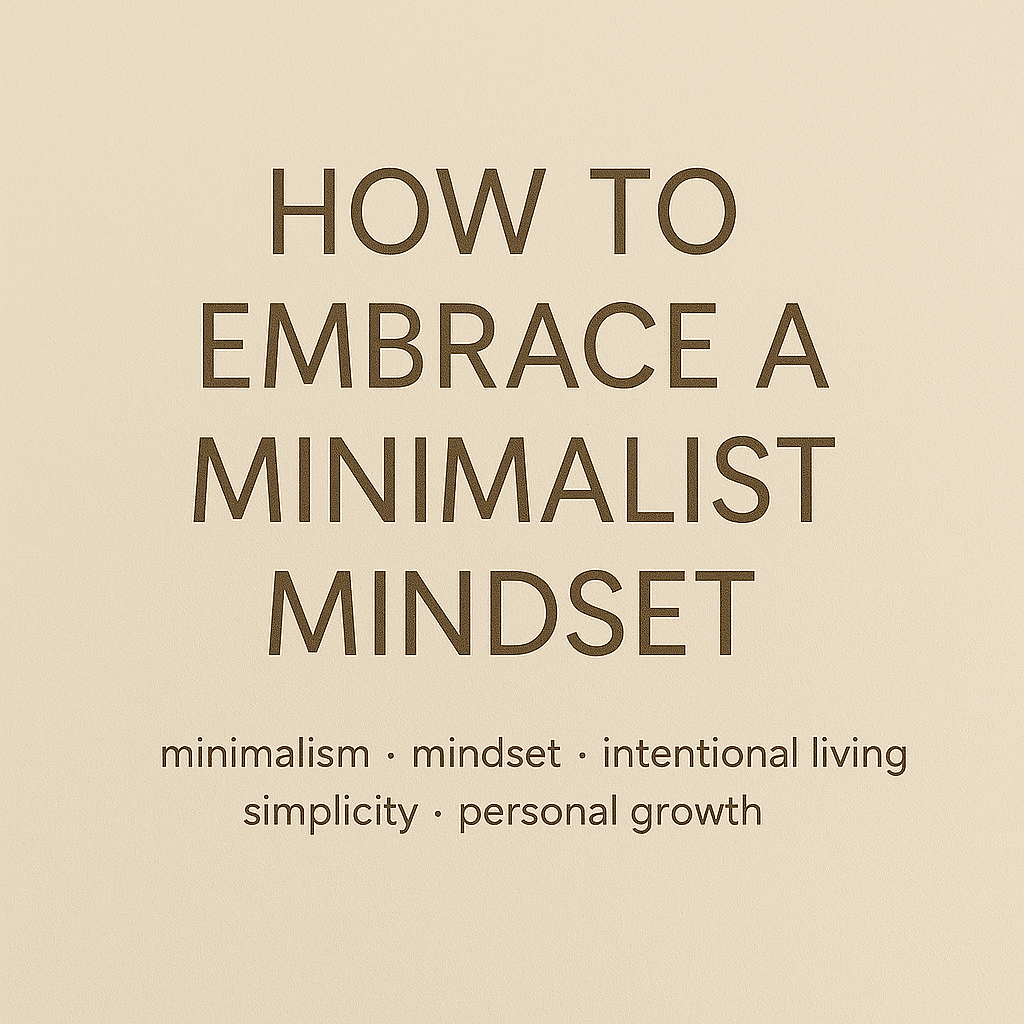
Introduction: The Power of Less
In today’s fast-paced world, we are constantly bombarded with advertisements, social media updates, and an overwhelming amount of choices. The pressure to own more, do more, and be more can be exhausting. But what if the secret to a happier and more fulfilling life was actually the opposite—choosing less?
Minimalism isn’t just about decluttering your physical space; it’s about transforming your mindset and focusing on what truly matters. By adopting a minimalist approach to life, you can gain clarity, reduce stress, and create a life filled with purpose and intention.
When I first embraced minimalism, I thought it was only about getting rid of excess possessions. But as I delved deeper, I realized it’s about making intentional choices, prioritizing what adds value to my life, and removing distractions that keep me from my goals. Let’s explore how you can cultivate a minimalist mindset to enhance your daily life.
Key Takeaways
- Minimalism is about intentional living, not deprivation.
- A minimalist mindset helps you eliminate distractions and focus on priorities.
- Reducing excess leads to greater mental clarity and emotional well-being.
- Minimalism allows you to live more freely and appreciate the present moment.
What Is a Minimalist Mindset?
Intentional Choices Over Excess
The minimalist mindset isn’t about owning fewer things just for the sake of it; it’s about making deliberate choices to focus on what brings true joy and purpose. Rather than accumulating possessions, commitments, or habits that don’t serve you, minimalism encourages simplifying your life to enhance your well-being.
A minimalist mindset challenges the societal norm of consumption. Instead of constantly striving for more—more clothes, more gadgets, more achievements—it shifts the focus to appreciating what you already have, cultivating gratitude, and making space for experiences that truly matter.
The Benefits of a Minimalist Mindset
Embracing a minimalist mindset can positively impact your mental health, productivity, and overall satisfaction in life. When you reduce unnecessary distractions, your mind becomes clearer, allowing you to make decisions with greater confidence and purpose.
One of the biggest advantages of minimalism is the relief from decision fatigue. By having fewer options and focusing on only what is essential, you free up mental energy that can be directed toward meaningful pursuits, whether it’s personal growth, creativity, or strengthening relationships.
How to Cultivate a Minimalist Mindset
1. Identify Your Priorities
Start by defining what truly matters to you. Minimalism is highly personal, and what works for someone else may not work for you. Consider what brings joy and meaning to your life, and eliminate the distractions that prevent you from focusing on those priorities.
2. Let Go of the Unnecessary
Decluttering is not just about physical items; it’s also about mental and emotional clutter. Unhealthy relationships, self-doubt, and unnecessary obligations can weigh you down just as much as a cluttered home. Learn to say no to commitments that do not align with your values.
3. Simplify Your Daily Routine
Too much complexity in your daily habits can lead to overwhelm. Simplify your routines by minimizing decision-making. This could mean streamlining your wardrobe with fewer but quality pieces, adopting meal planning to reduce stress, or creating a morning routine that sets the tone for a productive day.
4. Adopt Mindful Consumption
Minimalism encourages being intentional with purchases. Before buying something, ask yourself: “Do I really need this? Will this add lasting value to my life?” Avoid impulse buys and focus on quality over quantity. By purchasing only what is necessary, you save money and create a more sustainable lifestyle.
5. Focus on Experiences Over Possessions
Minimalism doesn’t mean you have to live without enjoyment—it just shifts your focus from material possessions to meaningful experiences. Instead of spending money on items that will eventually lose their appeal, consider investing in travel, learning new skills, or spending time with loved ones.
6. Practice Gratitude Daily
A minimalist mindset isn’t just about removing excess—it’s also about appreciating what remains. Take time each day to reflect on what you’re grateful for. This practice helps you stay present and reinforces the idea that you already have enough.
7. Set Boundaries for Digital Minimalism
The digital world is full of distractions. A minimalist mindset can be applied to technology by limiting screen time, unsubscribing from unnecessary emails, and curating your social media feeds to only include content that inspires and uplifts you.
Final Thoughts
Less Distraction, More Meaning
Minimalism is not about living with nothing—it’s about living with purpose. By adopting a minimalist mindset, you’re choosing to eliminate distractions and focus on what truly enriches your life. This shift allows for more clarity, joy, and personal fulfillment.
The journey to minimalism doesn’t happen overnight. It requires reflection, small intentional changes, and a willingness to let go of societal pressures. But once you start embracing simplicity, you’ll discover that the true essence of happiness isn’t in having more—it’s in appreciating what you already have.
minimalism
mindset
intentional living
simplicity
personal growth
